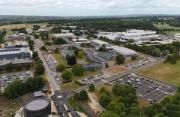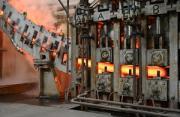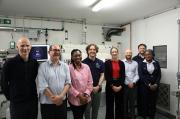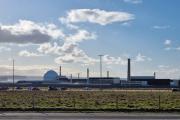Another Years Decommissioning Progress At Dounreay
31st July 2007
The annual report on progress to decommission the former experimental reactor site at Dounreay is published today by UKAEA, which is responsible for carrying out the safe clean-up and demolition of the site on behalf of the Nuclear Decommissioning Authority (NDA). It covers the 12-month period from 1st April 2006.
The report outlines the key decommissioning achievements during the year as well as safety, environmental and financial indicators, and summarises the performance-based incentives that are used by the NDA to measure delivery and award fee. During the year, the site delivered �164 million worth of work for the sum of �146 million.
Twenty-two buildings were demolished; the first heavily-shielded cell was decommissioned and dismantled; work to create containment around the intermediate level waste shaft continued; and over 115 tonnes of sodium were destroyed. Clean-up and dismantling work generated 3,576 drums of solid low-level radioactive waste that were processed for disposal.
There were 3 lost time accidents during a total of 4.3 million hours worked, which was a significant improvement in the site's safety performance. The highest radiation dose received by a member of staff was 2.04 mSv (out of a statutory annual limit of 20mSv), and the average radiation dose was 0.06 mSv. Discharges of radioactivity to the environment remained within the authorised limits. Nineteen radioactive particles were detected during monitoring of over five million square metres of local beaches.
Recycling increased considerably last year compared to previous years. The site recycled 34.8 tonnes of paper and over 300 tonnes of scrap metal.
Dounreay Director Simon Middlemas said that there were many reasons why the workforce should be proud of its achievements during the last year. "We have carried out work more efficiently than predicted, which has enabled us to bring forward projects from future years," he explained. "At the same time our safety and environmental performance has improved greatly, something we can be justly proud of. With this level of commitment and capability by the entire team at Dounreay, including our sub contractors, it sends exactly the right message to attract other businesses into the
area for the future prosperity of the North of Scotland."
Hard copies can be obtained from the Communications Department, Dounreay (tel: 01847 806080). Dounreay Review 2006/07 can be downloaded on UKAEA's website - http://www.ukaea.org.uk/downloads/dounreay/Dounreay_Review_2006_07.pdf
Related Businesses
Related Articles
UKAEA develops 3D printing for fusion components
At its recently opened Central Support Facility (CSF), UKAEA has commissioned an electron beam additive manufacturing machine that can be used to incorporate tungsten into components, alongside a selective laser manufacturing machine. Fusion can play a key role in a global low carbon energy future.Advancing Fusion Remote Maintenance: Industry Collaboration Driving Innovation
As part of the Fusion Futures (FF) programme, UKAEA's Remote Applications in Challenging Environments (RACE) has partnered with industry leaders to develop two groundbreaking technologies for remote maintenance in fusion energy engineering. Thanks to FF funding, industry has taken the lead in maturing UKAEA technology concepts—delivering real-world solutions that enhance operational autonomy and reduce maintenance burdens in extreme environments.UKAEA launches International Fellowships Scheme for fusion
UKAEA has launched the International Fellowships Scheme, an initiative to help expand the global talent pool supporting the fusion industry. The scheme is part of the UKAEA's Fusion Opportunities in Skills, Training, Education and Research (FOSTER) Programme, which aims to train, support, and empower the next generation of professionals, who will help deliver fusion power to the grid.Kyoto Fusioneering and Astral Systems join Culham fusion hub
UKAEA's Culham Campus welcomes Kyoto Fusioneering and Astral Systems as its latest tenants. Two pioneering companies, Kyoto Fusioneering and Astral Systems, have joined the growing cluster of fusion technology and AI organisations at United Kingdom Atomic Energy Authority's (UKAEA) Culham Campus.
Fusion-grade Steel Produced At Scale In UK-first
Researchers achieve 10x production cost savings for reduced activation steel. A United Kingdom Atomic Energy Authority (UKAEA) working group has successfully demonstrated the industrial scale production of fusion-grade steel.
UKAEA To Lead The Creation Of A Robotics And AI Cluster
UKAEA will lead the creation of a new £4.9m nuclear robotics and artificial intelligence cluster across Cumbria and Oxfordshire. The robotics and AI cluster was announced by UK Research and Innovation (UKRI) as one of seven new projects to kickstart economic growth and address regional needs: www.ukri.org The robotics and AI cluster will link Cumbria and Oxfordshire to accelerate the decommissioning of the UK's legacy nuclear fission facilities and keep people out of hazardous environments.
Diamonds Are Forever? World-first Carbon-14 Diamond Battery Made In Uk
The world's first carbon-14 diamond has been produced with the potential to provide power for thousands of years. Scientists and engineers from the UK Atomic Energy Authority (UKAEA) and the University of Bristol have successfully created the world's first carbon-14 diamond battery.
UKAEA Monthly Newsletter Latest Edition
Find out what has been happening at UKAEA in our monthly newsletter. Read about our recent activities and upcoming events.
UKAEA Newsletter - Edition 11 Published Today
Find out what has been happening at UKAEA in our monthly newsletter. Read about our recent activities and upcoming events.
Corwm Visits Dounreay Nuclear Site
Members were given an overview of the scale of the problem and challenges faced in the decommissioning of the site. In the last week of March 2024, several members of CoRWM led by the Chair, Sir Nigel Thrift, made the long journey up to the North of Scotland to visit the Dounreay nuclear site, now managed by Nuclear Restoration Services.
